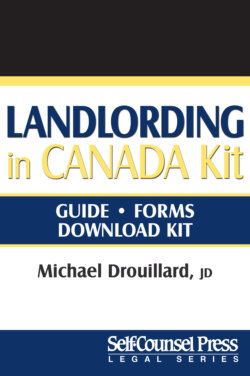Читать книгу Landlording in Canada - Michael Drouillard - Страница 37
На сайте Литреса книга снята с продажи.
Never Accept Tenancy Law Advice from Your Tenant
ОглавлениеStating the obvious? Not necessarily.
Here’s an example. On the first of the month when rent’s due, the landlord receives a package from the tenant with a letter (but no cheque):
Dear Landlord,
As you know, my car was broken into several days ago and I’ve decided that I want to move out of this high-risk area. I know that I am normally required to give you one clear month’s notice, but I just spoke to someone at the Residential Tenancy Office and was advised that because I feel endangered, I only have to give you 14 days’ notice.
Consider this my official 14-day notice to leave on July 15th. Since I am only staying for half the month, I am paying half the rent. Since I have already paid you a security deposit, you can consider my last month’s rent paid.
Yours truly,
Rick the Tenant
Many landlords would be confused upon receipt of such a letter, and would let Rick move. The only problem is, Rick didn’t speak with the Residential Tenancy Office, and there is no such thing as a 14-day notice, nor can he apply his security deposit to the rent without the landlord’s consent.
When your tenant tells you what the law is, you must always double check it on your own. Confirm with your own sources; your landlord association or provincial rental authority. Some tenants might seek guidance from a provincial rental authority or tenant’s rights group, but misunderstand the advice, receive incorrect advice, or choose to ignore the advice received. Sometimes there is no consultation at all. In fact, a small minority of tenants use creative interpretation of the law to posture themselves to take advantage of the landlord’s inadequate understanding of the law.
